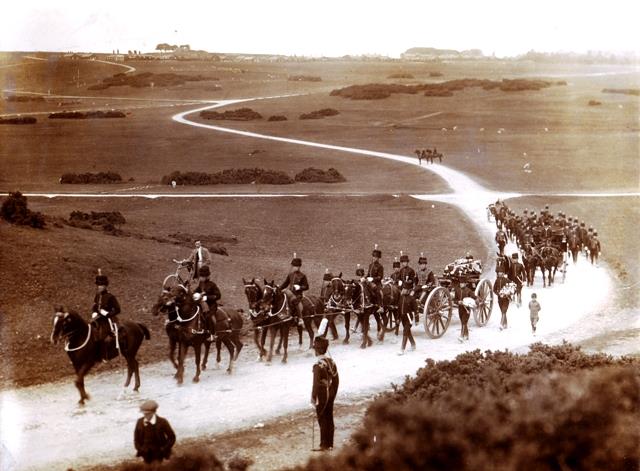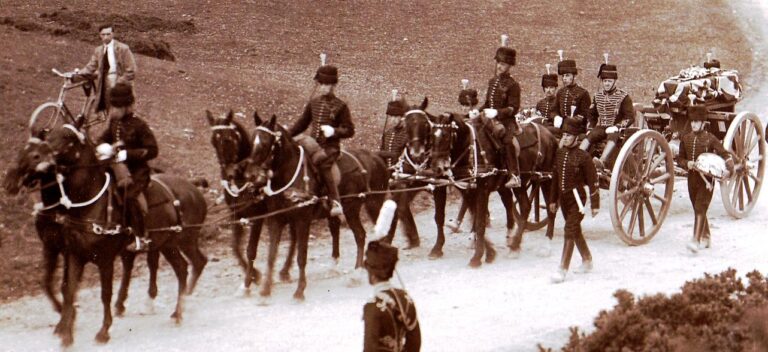CURRAGH MILITARY FUNERAL

CYRIL ALEXANDER GARDNER who died last week from a shot wound accidentally inflicted whilst cleaning his captain’s revolver. Aged 19 years and eight months, he was the fourth son of Mr. Walter and Mrs. Frances Gardner, 137 Magdalen road. Mr. Gardner was in the Royal Horse Artillery, stationed in Ireland, and was buried at Curragh Cemetery with full military honours.
Karel was able to immediately identify the location of the photograph as being close to the military cemetery and put Caroline in touch with the Local Studies Dept. Gardner’s name does not however appear on the excellent transcription list for the Curragh Cemetery which was done by Mick Dolan. Because we can now search The Kildare Observer we were able to look for a local obituary, however nothing was located for Gardner. When we searched for Cyril Alexander we found the obituary and noticed the surname was recorded as Gardiner in the newspaper.
The Kildare Observer, November 1, 1913
TRAGIC OCCURRENCE NEWBRIDGE BARRACKS
INQUEST AND VERDICT
On Friday last DR. E. Cosgrove, Coroner for North Kildare, held an inquest at the Military Hospital, Newbridge Barracks, on the today of a young man named Cyril Alexander Gardiner, aged 21 years, military servant to Captain the Hon. O. H. Stanley, “D” Battery, R.H.A.
The following were sworn on the jury – Messers. P. Charleton, P. Burne, Joseph Kelly, T.C; John Coffey, A. Crossley, A. McKinley, M. O’Brien, K. Wallace, E. Geo M. O’Brien.
Sergt. J. Whisker appeared on behalf of the police.
Captain the Hon. O. H. Stanley deposed that deceased had been over six months in his employment as military servant. He was about 21 years of age. He always found him to be quiet, sober, steady young man, and as far as he knew there were no circumstances that would have induced him to commit suicide. At about 8.20 p.m. on the previous night the waiter came to witness and told him his civilian groom, Henry Heal, wanted to see him. He then accompanied the latter to his (witness’s) quarters and went upstairs with Heal. He found deceased lying in a pool of blood with his head against the door. Witness searched the room and found his revolver lying on the floor about five yards from where deceased lay. Near the revolver he found an empty cartridge and a full one. He now identified the revolver as his (witness’s) property. The cartridges also were those he used for the revolver, which contained seven chambers. If fully loaded when one cartridge was fired another automatically came into position. It was also a self ejector, which accounted for the empty cartridge being found on the floor.
To the Coroner – if there were two cartridges in the magazine, when the first was fired and ejected, the second one would have been found in position in the revolver. It was an intricate piece of mechanism, and it would want to be understood to use it. There were no cartridges in the revolver when he saw it previous to finding it on the floor.
Henry Heal deposed – I am a civilian groom in the employment of Captain the Hon. O. H. Stanley and live at Newbridge. I knew the deceased, Cyril Alexander Gardiner. I last saw him alive at 8.5 p.m. on last night. He was in the kitchen of the officer’s quarters. The deceased was then sober and apparently in his usual health. I never heard him make any threat to take his life, nor did he appear to be depressed in any way. Deceased went upstairs to Captain Stanley’s quarters and was absent about three minutes when I heard something like a fall. I then went upstairs to Captain Stanley’s room and found deceased lying on the floor with his head against the door of the ante room. I saw a lot of blood around. I felt his pulse and he appeared to be quite dead. I immediately went and informed Captain Stanley, who accompanied me to the room.
By Mr. McKinley – He never heard deceased make any threat. There was nothing noticeable about him in any way that would suggest any such thing. As far as witness knew, deceased was not in trouble of any description.
Capt. Sidney Clement Bowle R.A.M.C. Newbridge Hospital, deposed – I was called to deceases about 8.35 p.m. and arrived at Captain Stanley’s quarters at 8.45 p.m. I saw the body lying on the floor. Deceased was then in my opinion about half an hour dead. I made a superficial examination of the body and found a bullet wound at the right temple, which had an exit wound on the left side of the head. I found no other wounds on the body. Death in my opinion was due to shock and haemorrhage, the result of a bullet wound o0n the left side of the head.
Sergt. Whisker (to the Coroner) – I may state, sir, that I have searched the effects of deceased and have found nothing that would indicate his intentions of committing suicide. He believed deceased was a native of Oxford. Mr. Charleton (foreman) – Considering the intricate mechanism of the revolver, as explained by Captain Stanley, there is a possibility of the unfortunate occurrence having been an accident, and in consequence I would be in favour of returning an open verdict.
Mr. McKinley – I do not see that we have the slightest evidence that it was accidental.
The Coroner said it was a regrettable occurrence, and they had heard the evidence, which did not in any way point to the fact that there was any known reason why deceased should take his own life. As far as they knew deceased was not in any pecuniary difficulties nor was he depressed or suffering from melancholia or illness of any kind which might lead up to it. There was just a possibility that it might have been an accident. Anyone tampering with the revolver and not knowing the working of it, which was rather intricate might possibly have accidentally shot himself.
The following verdict was returned: – “That the deceased, Cyril Alexander Gardiner, died at Newbridge Barracks from shock and haemorrhage, the result of a bullet wound self inflicted.”
Deceased, who was of a very lively temperament, was very popular with his comrades and numerous civilian friends, and the greatest sympathy is expressed for his relatives.
Deceased was interred on Monday with full military honours at the Curragh cemetery. The firing party consisted of “D” Battery, R.H.A. followed by the band of the 16th (Queen’s) Lancers, who preceded the gun carriage bearing the coffin on which were a number of beautiful wreaths presented by his comrades and friends.
The greatest sympathy is expressed on all sides for his father and mother, who were present in the sad cortege, and his family.
The funeral procession, prominent in which was the charger of deceased led by a comrade, was brought up by large parties of “D” Battery, R.H.A., and Royal Field Artillery, and was a most imposing spectacle.

On behalf of Kildare Library & Arts Services and the people of Co. Kildare at large, particularly the local history community I would like to thank Caroline for permission to re-print this truly remarkable photograph of a military funeral on the Curragh in 1913. We are delighted to have been able to find such a detailed account of the young man’s tragic death. Certainly it was not unique and we have come across similar tragic incidents in the local newspapers in the past. The detail contained in the account, the photo of the funeral procession and the image of the young man in uniform do however provide us with a unique insight into the unfortunate incident. Our thanks to Caroline and Karel for making it possible to publish them on EHistory and share them with you all.
Mario Corrigan
The tragic account of the death of Cyril Alexander Gardner in November 1913 which produced a wonderful photograph of his military funeral to the Curragh Military Cemetery, Co. Kildare. A great piece of family history research!
